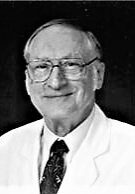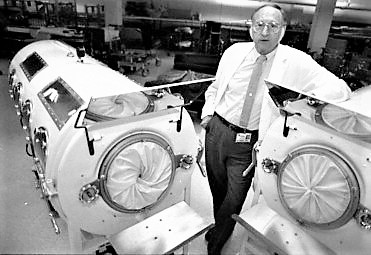People
Notable People
Dr. Robert Eiben - Cleveland's "Polio Doc"
13303 Lake Shore Boulevard, Bratenahl Place, and 2 Oakshore Green

Dr. Robert M. Eiben was a pioneer in the treatment of poliomyelitis and a professor of pediatric neurology.
Robert Eiben was born on July 12, 1922, to Michael and Francis Eiben in Cleveland. He grew up not many blocks from the City Hospital in which he spent almost forty years of his professional life. Robert was a “blue baby” at birth, but his congenital cardiac defect was not diagnosed. At age five he remained sickly and somewhat overprotected by his mother. His parents did, however, allow a tonsillectomy to be performed on the kitchen table, with his businessman father administering the ether.
Robert attended Cleveland Public Schools and graduated from West Technical High School in 1940. He then enrolled in what became a six-year combined B.S. and M. D. degree program at Adelbert College.
The director of the Division of Contagious Diseases, Department of Pediatrics was impressed with Eiben and invited him to serve as an acting intern in the Contagious Disease Unit of the City Hospital. An official medical internship followed at the University Hospital’s Babies and Children’s Hospital. That confirmed for him his wish to be a pediatrician.
Dr. Eiben's “first career” as an infectious disease physician at Cleveland’s City Hospital (MetroHealth) began in 1945. He elected a medicine internship, figuring that the experience would be valuable. However, part of his residency year included time spent as a resident in pediatrics and a fellow in infectious diseases at City Hospital.
The internship also introduced him to Dorothy Crowley, a student nurse. Each quickly became attracted to the other and they married. This momentous decision required his leaving staff quarters. For Dorothy, the decision to marry was more momentous. Regulations did not permit nursing students to marry. Dorothy chose to resign, although she had just one required rotation left to earn her nursing degree. A new job in the accounts office paid the family bills.
In 1948, Dr. Eiben earned one of the highly competitive residency positions at Cleveland Babies and Children’s Pediatric Residency and Fellowship Program under the direction of a new chair of pediatrics, Dr. Charles McKhann, from Boston Children’s Hospital. This was right before the polio epidemic that started in 1949. Dr. McKhann had pioneered the management of childhood poliomyelitis with an early artificial respirator.

Eiben became an expert in treating polio that had no known cure. His success with caring for and transitioning polio victims back to their homes gained national recognition for the hospital. In 1950, Eiben assumed the responsibility as acting director of the Contagious Disease Unit. Six months later, he assumed the additional role of interim director of the Pediatric Unit. He also worked as a pediatrician for Parmadale Children’s Village. All of this was performed in the context of his precarious health.
In the event of impending breathing failure, the use of a tank respirator, that enclosed the whole body except the head and in which alternate pulsations of high and low pressure that force air into and out of the lungs was used. Dr. Eiben displayed exceptional sensitivity to parental fear, grief, and guilt.
Dr. Eiben was able to teach his residents the nature and limitations of what could and should be said to parents. Dr. Eiben learned and was able to calm and soothe children whose sense of claustrophobia terrified them as they were being placed in a tank respirator. He became a master at reading and understanding the minds of children and parents.
In January 1950, Dr. Eiben was promoted to the position of acting director of the Contagious Disease Unit of the Toomey Pavilion. Six months later he was appointed as acting director of the Pediatric Unit at the City Hospital. Eiben also assumed responsibilities as a pediatrician for the 500-bed Parmadale Children’s Village.
The effectiveness of the polio vaccine, demonstrated in the 1954 field trial, suddenly and permanently ended many career concentrations of polio research and treatment. More than 2,000 polio cases were admitted to City Hospital between 1949 and 1955. In 1956 that number fell to 80. Remarkably, new cases of polio were rare in 1957 and thereafter non-existent.
For all his efforts, Eiben had become known as “Greater Cleveland’s Polio Doc.” The advent of the Salk vaccine caused a dramatic fall in polio attacks. His patient load diminished, and Eiben was searching for a new career.
In 1957, Dr. Eiben, as a director of one of the fifteen centers in the United States for poliomyelitis care and research, was invited to the International Poliomyelitis Conference in Geneva to deliver a lecture on his experience with the Tank Respirator, commonly referred to as the “Iron Lung,” much to Dr. Eiben’s distress. In recognition of his contributions in the care of children with poliomyelitis, Dr. Eiben received the Presidential Award in Geneva. Dr. Eiben characteristically praised children and their parents for their courage and determination.
In October 1958, Eiben developed an infection of the lining of his heart that required one month of hospitalization with high hourly doses of penicillin and intramuscular streptomycin. An additional two weeks of treatment at home of parenteral therapy were managed by Eiben’s wife and by colleagues. Worried by her husband’s health and lacking life insurance to support the family should he die, Dorothy returned to nursing school.
Open heart surgery at the Mayo Clinic in 1959 corrected Eiben’s cardiac defects. As he recovered, he learned of a new, relatively unexplored field that specialized in pediatric neurology. In 1960, the University of Washington offered Eiben a fellowship. Dr. Eiben and his family drove to Seattle where Eiben trained in neurology for three years.
Eiben returned to the Cuyahoga County Hospital System in 1963 as director of the Child Neurology Department. Dr. Eiben achieved the rank of professor of pediatrics in 1975 and of neurology in 1985.
Quite active in the Child Neurology Society, he was elected secretary-treasurer in 1978 and became the society’s twelfth president. Dr. Eiben served in numerous capacities in his professional community, paying particular attention to supporting the development of the library of the Cleveland Academy of Medicine. His generous contributions to the holdings were made quietly over many years. Dr. Eiben continued the MetroHealth neurology training program as a “one-man show” until his retirement in 1991.
His service was commemorated by his election to the Cleveland MetroHealth Hall of Fame. His commemoratory entry stated, “Born frail, Eiben demonstrated the strength of resolve and dedication as he laid the foundation for a recognized neurology department at MetroHealth while providing compassionate care for an untold number of young patients.”
Over his extraordinarily varied and busy career, Eiben found time to serve Bratenahl Village. He was elected to Bratenahl Council in 1982 and served for twenty years. He was also involved in the early struggle to save the Bratenahl schools and became involved in negotiations with the superintendent of the Cleveland Public Schools about the terms of the forced merger.
Dorothy Eiben’s ill health prompted a move to Bratenahl Place in 1974. She died on November 6, 1974. Robert and Dorothy had six children: Daniel born on May 8, 1947, Christopher J., born on March 24, 1949, Thomas M., born on June 21, 1950, Mary P. (Balbo), Charles, and Elizabeth Ann, born on May 2, 1960.
Robert married Anne Balbo in 1981, a high school sweetheart who raised her own family of twelve children: Peter, Marianne (Karaffa), Ruth (Khalsa), Janne (Bissett), Martha (O’Leary), George, Jack, Susan (Kelley), Marc, Thomas, Joseph, and Constance (Rieb). Anne’s son George eventually married Eiben’s daughter Mary.
Anne died on February 23, 2013. Robert died of complications from congestive heart failure on December 28, 2013. Dorothy and Anne were buried on either side of Robert in Calvary Cemetery.
Dr. Eiben was honored in 2005 with the presentation of the Lifetime Achievement Award of the Child Neurology Society at its annual meeting in Los Angeles.
Eiben’s honors include the Robert M. Eiben Lectureship in pediatric neurology established at Case Western Reserve University, recognition by the Fourth International Congress of Poliomyelitis for his work on respiratory centers, and being inducted into MetroHealth’s Hall of Honor. He also served multiple leadership roles, including the president, of the Child Neurology Society.
Bob Eiben’s greatest impact was his unwavering passion with which he advocated for patients and children. He taught and exemplified the importance of an awareness of the various “psychosocial” and ethical elements of human disease. His experience with a wide variety of severe acute and chronic neurological diseases, including his illness, prepared him uniquely for such a role. He worked long hours, but somehow maintained strong commitments to his family throughout his career.
